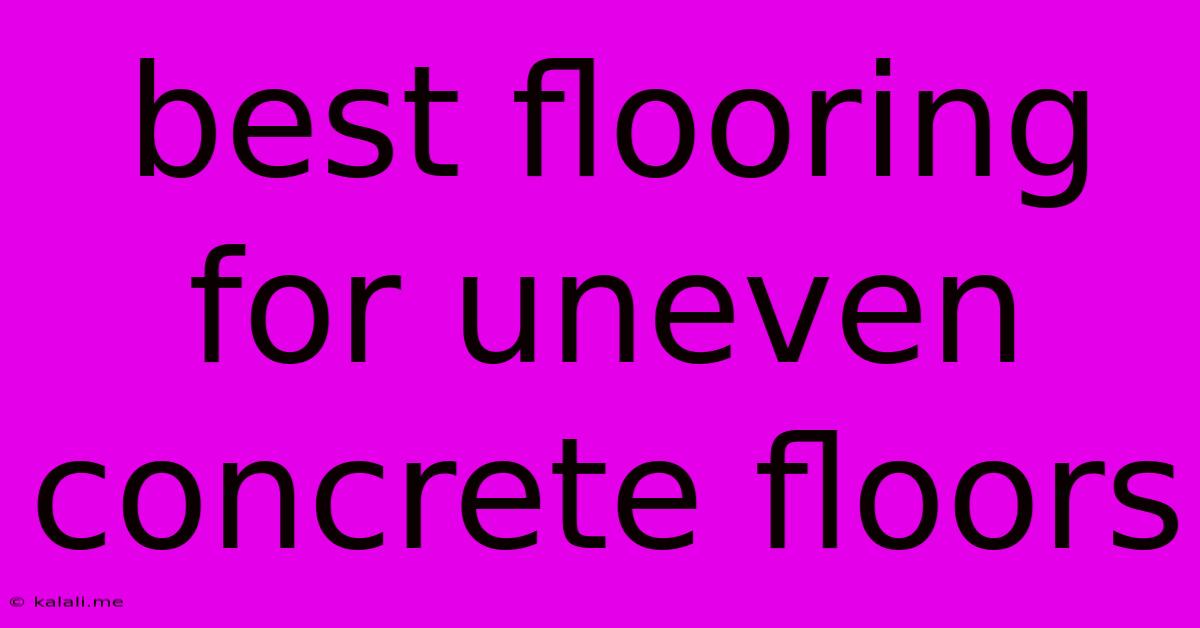Best Flooring For Uneven Concrete Floors
Kalali
May 25, 2025 · 3 min read

Table of Contents
Best Flooring for Uneven Concrete Floors: A Comprehensive Guide
Choosing the right flooring can transform your space, but tackling uneven concrete floors adds a layer of complexity. This guide explores the best flooring options for uneven concrete, considering factors like cost, durability, and ease of installation. Finding the perfect solution depends on your budget, aesthetic preferences, and the severity of the unevenness.
Uneven concrete floors present a challenge for many flooring types, leading to instability, squeaking, and premature wear. However, several resilient and stylish options can effectively mask imperfections and create a level, comfortable surface.
Assessing Your Uneven Concrete Floors
Before selecting flooring, assess the severity of the unevenness. Minor imperfections might be manageable with underlayment, while significant dips and bumps require more substantial solutions. Consider:
- Level of unevenness: Use a level to measure the discrepancies. Minor variations can often be addressed with self-leveling compound. Significant dips and rises may necessitate a more extensive leveling process.
- Extent of the unevenness: Is it localized to a specific area, or is the entire floor affected? This helps determine the scope of the repair and the most cost-effective solution.
- Type of concrete: Is the concrete cracked, stained, or otherwise damaged? Addressing underlying issues before installing flooring is crucial for long-term success.
Top Flooring Choices for Uneven Concrete Floors
Several flooring options excel at concealing unevenness and providing a comfortable walking surface.
1. Vinyl Flooring (Luxury Vinyl Plank/Tile): A popular choice due to its versatility, durability, and affordability. Luxury vinyl plank (LVP) and luxury vinyl tile (LVT) are particularly effective because they can easily hide minor imperfections. Their thicker construction provides better cushioning and stability. Installation is relatively simple, and they're available in various styles mimicking hardwood, stone, or tile.
2. Engineered Wood Flooring: Engineered wood is more stable than solid hardwood, making it a better choice for uneven subfloors. It's also more moisture-resistant, crucial in basements or areas prone to humidity. The layers of plywood provide a more forgiving base, minimizing the impact of minor inconsistencies. However, significant unevenness may still require leveling.
3. Laminate Flooring: Laminate is a budget-friendly option that offers decent durability and a wide array of styles. It's relatively easy to install, and an underlayment can help absorb minor imperfections. However, it's less forgiving than LVP or engineered wood, and water damage can be a concern.
4. Carpet: Carpet is an excellent choice for masking significant unevenness. The thick pile effectively conceals imperfections and provides a soft, comfortable walking surface. However, regular cleaning and maintenance are necessary to prevent stains and odors. Consider a thicker carpet padding for added cushioning and sound insulation.
Addressing Severe Unevenness
For severely uneven concrete floors, addressing the underlying issues before installing flooring is vital. Options include:
- Self-Leveling Compound: This is a cost-effective solution for minor unevenness. It's poured over the concrete and self-levels to create a smooth surface.
- Concrete Grinding/Leveling: For more significant unevenness, professional grinding and leveling might be necessary. This process removes high spots and fills low areas to create a consistently level surface.
Choosing the Right Underlayment
Regardless of the chosen flooring, using an appropriate underlayment is essential. Underlayment adds cushioning, improves sound insulation, and helps to level minor imperfections. Several types are available, including foam, felt, and rubber underlayments, each with its benefits and drawbacks.
Conclusion
Selecting flooring for uneven concrete floors requires careful consideration of the severity of the unevenness, your budget, and your desired aesthetic. Luxury vinyl plank/tile, engineered wood, and carpet are excellent options offering durability, style, and the ability to mask imperfections. Addressing significant unevenness might necessitate professional intervention. Remember that proper preparation, including choosing the right underlayment, is crucial for a successful and long-lasting flooring installation.
Latest Posts
Latest Posts
-
Do You Speak Spanish In Spanish
May 25, 2025
-
Mac External Moniter Disconnects Power Settings
May 25, 2025
-
How To Use Schema Visualization In Azure Data Studio
May 25, 2025
-
How Do You Say The In Japanese
May 25, 2025
-
Under Shel Wire Rack Screwed On
May 25, 2025
Related Post
Thank you for visiting our website which covers about Best Flooring For Uneven Concrete Floors . We hope the information provided has been useful to you. Feel free to contact us if you have any questions or need further assistance. See you next time and don't miss to bookmark.